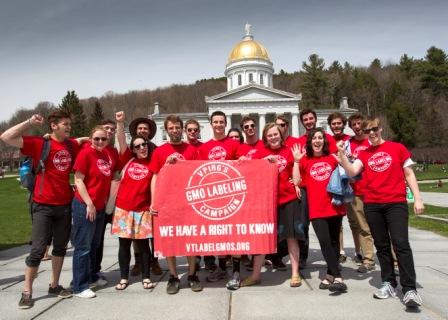VPIRG took on some of the nation’s most powerful corporate interests in the 2014 legislative session, and we won! From landmark legislation requiring GMO foods to be labeled to expanding opportunities for Vermont families to go solar, this was an incredible year. We also helped to pass a new law that will help protect kids from toxic chemicals and stopped bills that threatened clean energy and Vermont’s popular Bottle Bill recycling program. Though we didn’t win every fight, VPIRG’s unique blend of research, strong partnerships, and the biggest network of citizen activists in the state proved – once again – to be a winning combination.
With the tremendous support and activism of VPIRG members behind us, we are proud to share these 2014 accomplishments.
CONSUMER PROTECTION
H.112– Protecting Your Right to Know GMOs – In a historic vote, the Vermont Legislature passed the nation’s first “no strings attached” GMO labeling bill. This VPIRG-backed legislation protects your right to know whether the food you’re considering purchasing contains genetically engineered ingredients (a.k.a. genetically modified organisms or GMOs), and was signed into law by Governor Shumlin on the State House steps on May 8th, 2014.
ENVIRONMENTAL HEALTH
S.239 – Toxic-Free Families Act – On May 10th – the second to last day of the legislative session – the Vermont Senate gave final approval to S.239, which is designed to protect kids from exposure to toxic chemicals found in children’s products. The bill establishes a list of dangerous toxins, requires businesses that use any one of those chemicals in children’s products to report to the state, and gives experts at the Vermont Department of Health the authority to regulate those toxins. This is an incredible victory for children in Vermont, who will soon be better protected from the dangerous chemicals used in everything from teething rings to teddy bears.
CLEAN ENERGY
H.702 – Victory for Solar in Vermont – Early in the session, the Vermont House voted 136-8 to update the state’s net metering law, which allows Vermonters to go renewable and offset their electric bills in return. Shortly after, the Vermont Senate followed suit and voted 28-0 in favor of the bill. Net metering works, and is a big part of why Vermont is 9th in the nation in installed solar power per capita, and solar is more affordable and easier to install than ever before. Updating net metering means more Vermonters can take advantage of the state’s most successful renewable energy program.
S.191 – Renewable Energy Setbacks Defeated – In one of the more dramatic votes of the legislative session, senators defeated S.191 by a vote of 21-8. The bill would have put up new roadblocks restricting the ability of homeowners, businesses, farmers, and others to go solar. A second bill designed to put up roadblocks to renewable wind energy in the state never even made it to a vote in the Senate. But a small band of senators with a history of opposing clean energy and/or questioning the science of climate change has vowed to continue to oppose renewable energy projects in the future.
HEALTH CARE
S.252 – Health Care Benefits – This year we were able to protect Vermont consumers by ensuring that essential health care services are included from Green Mountain Care. After the Senate passed language that would have excluded adult vision and dental from the universal benefits package, we were instrumental in ensuring that the final benefits package will be decided in an open deliberative process at the Green Mountain Care Board.
DEMOCRACY
S.82 – Money in Politics – The Vermont House and Senate worked hard in 2013 to craft legislation – S.82 – that would have required increased reporting from political action committees (PACs), candidates and others while lowering limits on political contributions. In a remarkable reversal of past priorities, Vermont legislators opened the 2014 session by changing course on S.82. Lawmakers suddenly decided to alter the legislation, allowing much larger contributions from individuals, corporations, PACs and political parties. Because of this, VPIRG could not back the bill. However, there were three important campaign finance improvements in the bill that we did support:
- It reduces the amount of money that contributors can give to candidates for state House and Senate seats.
- It calls for a new online tracking system in the Secretary of State’s office so that people can more easily determine who is giving money to whom in political campaigns.
- It reinvigorates the state’s public financing system for qualifying candidates for governor and lieutenant governor.

